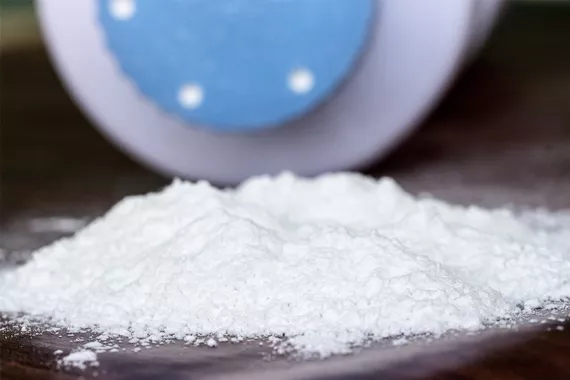
Case Overview
Generations of people have used talcum powder to keep their skin dry and prevent odors. But many who used it didn’t know about the link between talcum powder and asbestos. This gap in knowledge has led to thousands of people being diagnosed with asbestos-related cancers. Let’s explore the connections between cancer, talcum powder and asbestos.
Key takeaways about talcum powder and asbestos
- Talcum powder has been used in personal care products for decades. Some of the talcum powder available to consumers has contained asbestos.
- People who have been diagnosed with mesothelioma or ovarian cancer are suing manufacturers of talc-based products and talc suppliers.
- Johnson & Johnson has proposed a $6.4 billion bankruptcy plan for ovarian cancer claims related to use of talcum powder.
What is talc?
Talc is a common, naturally occurring substance frequently used in consumer products like cosmetics and personal care items. Industry experts estimate the talc market size at 7.66 million tons in 2024.
Medicine and food items might contain talc, as well. It can prevent lumps from forming in starch, chocolate, salt, baked goods and seasonings.
Cosmetic talc is a key ingredient in talcum powder, which is a common product for absorbing moisture on the body.
Does talc have asbestos?
Yes, some talc-based products may contain asbestos. Geologists have long associated talc with asbestos. They are often formed in the same host rock. Talc mining operations may contaminate the talc they collect with asbestos fibers. It’s also possible that talc deposits contain asbestos fibers without any cross-contamination from mining.
Asbestos is a widely known carcinogen. Asbestos is associated with a number of health risks, including:
- Asbestosis, a progressive non-cancer lung disease
- Lung cancer
- Mesothelioma, a cancer that affects the thin lining of the lungs, abdomen, heart or testes
Even the non-asbestos form of talc could be dangerous. A United States National Toxicology Program study found that talc is a carcinogen, even without the presence of asbestos fibers.
Is there asbestos in talcum powder?
Because talc and asbestos are often found in the same host rock, it’s difficult to conclusively say that talcum powder is asbestos-free. A 2014 study examining an unnamed brand of talcum powder found asbestos. Researchers examined the samples using spectrometers and electron microscopes.
In 2019, the FDA issued an advisory for Americans to stop using Johnson’s Baby Powder from Lot #22318RB. According to the advisory, samples from that lot contained asbestos. Johnson & Johnson voluntarily recalled the lot after it tested positive for asbestos.
Still, many companies have claimed their talcum powder is asbestos-free. A cosmetics trade association set voluntary guidelines in 1976 that talc used in cosmetic products sold in the US should be “free from detectable amounts of asbestos.”
There is no safe amount of asbestos exposure. Any exposure to asbestos can lead to cancers like mesothelioma.
What are the health concerns of talcum powder?
Lung damage, mesothelioma and ovarian cancer are primary public health concerns of using talcum powder. Let’s examine the health risks of using talcum powder and talc-free alternatives.
Talcum powder and lung diseases
Inhaling talc over time can irritate the lungs. Babies face higher risks, but adults sometimes develop coughs and have trouble breathing from talcum powder. As early as 1981, the American Academy of Pediatrics warned of dangers from baby powder inhalation. Authors of a study believed “the true incidence of baby powder inhalation is grossly underestimated.”
In addition, asbestos is linked to various lung diseases and disorders, including lung cancer and asbestosis. Asbestos-contaminated talc may also cause these health issues.
Talcum powder and mesothelioma
Asbestos-containing talcum powder is also linked to mesothelioma. This illness is a cancer that affects the thin layer of tissue that covers the majority of a person’s internal organs. The most common form is pleural mesothelioma, which affects the lining of the lungs (or pleura).
A 2020 study concluded that talcum powders that contain asbestos can cause mesothelioma. The study examined 33 people diagnosed with malignant mesothelioma. They all had no known exposure to asbestos other than talcum powder.
Talcum powder and ovarian cancer
People have often used baby powder or talcum powder to reduce genital moisture and odor. Authors of a study that included nearly 20,000 women concluded that using powder on the genital or perineal area corresponded to a 20 – 30% increase in certain types of ovarian cancer.
More than 57,000 plaintiffs are also currently suing Johnson & Johnson for ovarian cancer linked to talcum powder. These cases are part of a multidistrict litigation (MDL) docket in New Jersey. It’s the second-largest MDL in the nation. The Honorable Michael A. Shipp is the presiding judge. These ovarian cancer cases blame talc for its own carcinogenic properties, not asbestos.
Are there any alternatives to talc in baby powder?
Yes, corn starch is an alternative to talc. It’s not known to contain asbestos. Still, it’s a good idea to be cautious when inhaling any sort of powder. Some pediatricians don’t recommend baby powder of any kind for diaper rash.
Johnson & Johnson talcum powder lawsuit
Some J&J talcum powder lawsuits have received jury verdicts. One verdict included $260 million to an Oregon woman who alleged that the company’s body powder caused her cancer.
The company has agreed to a $700 million settlement payout related to how it marketed its talc-based products. This is not a payout to cancer victims, but to states for deceptive marketing practices. Part of the settlement includes a permanent end to manufacturing, selling and promoting talc-based personal care products.
Johnson & Johnson has also proposed a bankruptcy plan that would offer more than $6.4 billion to resolve all ovarian cancer claims. If confirmed, this plan would resolve current and future claims that using talc-containing products caused women to develop ovarian cancer. Some worry this plan is J&J’s effort to sidestep legal responsibility for its wrongdoings, as the company is still very financially solvent and does not need to declare bankruptcy.
Motley Rice represents clients who may have developed ovarian cancer as a result of using talc. Our team focuses on the dangers posed by talc alone. One of our talcum powder attorneys can provide a case evaluation.
Who may be eligible for a talcum powder lawsuit?
People who have been diagnosed with ovarian cancer from using talc-based baby powder products may still be eligible to file suit. The main defendants in these lawsuits are Johnson & Johnson and certain subsidiaries. These companies have manufactured, marketed and sold cosmetic talc products known to be dangerous for decades.
Prior defendants include:
- Imerys Talc America, Inc.: Talc miners and distributors who supplied J&J. They are also affiliated with Luzenac America, Inc. and Rio Tinto Minerals, Inc.
- Personal Care Products Council: A cosmetics industry trade organization.
To file a lawsuit, you will also need certain evidence. A talc lawyer can help gather documents such as physical evidence, proofs of purchase, medical records and insurance claims to prove that:
- Your ovarian cancer is related to the use of talc-based personal care products
- You regularly used cosmetic talcum powder products
- You were diagnosed with a cancer that resulted from using talc products
If you believe you meet these criteria, contact a Motley Rice talcum powder attorney.
Our toxic exposure experience
Motley Rice has a long history of advocating for consumers against multinational businesses, especially in lawsuits related to women’s health. Two of our attorneys, Daniel Lapinski and Carmen Scott are members of the Plaintiffs’ Steering Committee for federal multidistrict litigation (MDL) cases against Johnson’s Baby Powder and other talc-based products.
Our attorneys also represent clients in numerous other women’s health litigation, such as a mass tort for faulty Paragard intrauterine birth control devices.
Read more about our talcum powder litigation experience.
Key takeaways
What it talc?
Is there asbestos in talcum powder?
Contact a talcum powder attorney
What are the health concerns of talcum powder?
Johnson & Johnson talcum powder lawsuit
Our toxic exposure experience
- Sources
- American Academy of Pediatrics. Baby Powder — A Hazard!
- American Cancer Society. Talcum Powder and Cancer
- Avani Group of Industries. Talc in Food Processing
- CBS News. Johnson & Johnson reaches $700 million settlement in talc baby powder case
- Commonwealth of Massachusetts. Talc in cosmetics and consumer products
- Environmental Protection Agency. Learn About Asbestos
- Environmental Working Group. Cosmetics companies face major concern over asbestos contamination of talc
- Gordon R, Fitzgerald S, Millette J. Asbestos in commercial cosmetic talcum powder as a cause of mesothelioma in women. International Journal of Occupational and Environmental Health. 2014 October; 20(4): 318-332
- Journal of Occupational and Environmental Medicine. Mesothelioma Associated With the Use of Cosmetic Talc
- Minnesota Department of Health. Why is asbestos dangerous?
- Mordor Intelligence. Talc Market Size & Share Analysis - Growth Trends & Forecasts (2024 - 2029)
- Never Again Consulting, Inc. Report to Congress
- Reuters. Johnson & Johnson reaches $700 million talc settlement with US states
- Time. Cornstarch Vs. Talc: Is Any Baby Powder Safe?
- US Food and Drug Administration. FDA Advises Consumers to Stop Using Certain Cosmetic Products
- United States Judicial Panel on Multidistrict Litigation. MDL Statistics Report - Distribution of Pending MDL Dockets by Actions Pending
Start Your Motley Rice Consultation in Simple Steps
Submit Information
Call us or fill out our online form with the details of your potential case.
Case Review
Our team reviews your information to assess your potential case.
Case Consultation
Talk with us about next steps.


